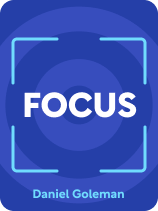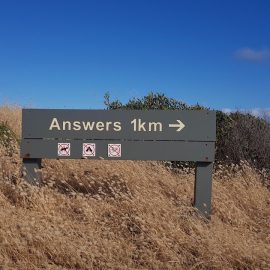

This article is an excerpt from the Shortform book guide to "Focus" by Daniel Goleman. Shortform has the world's best summaries and analyses of books you should be reading.
Like this article? Sign up for a free trial here.
Is mind-wandering beneficial? Can attention be trained? How can systems awareness make you a better leader?
In Focus: The Hidden Driver of Excellence, Daniel Goleman explores how you can understand, harness, and improve your attention. This results in a more fulfilling, productive life as you become a healthier, more adaptive, and more engaged citizen of society and the planet.
Read more for an overview of this practical book.
Overview of Focus: The Hidden Driver of Excellence
Goleman argues that attention is a complex and underappreciated cognitive resource in our modern society overrun with distractions. Your relationship to this resource—how you use it, strengthen it, and restore it—affects virtually every aspect of your life.
In Focus: The Hidden Driver of Excellence, he asks readers to consider that what you focus on indicates what you care about—what we, as a collective, care about—and how this will impact the planet’s future.
Goleman is a psychologist and science journalist known for his work on emotional intelligence and leadership. His work has been widely influential in psychology, education, and business. In addition to his writing, Goleman is also a speaker and consultant, and he has worked with organizations around the world to help them improve their leadership and management practices.
We’ll explore Goleman’s explanations of how attention works and his theories about the three directions we can deploy our attention—inward, toward other people, and outward toward the wider world. We’ll also explore how attention impacts our lives and Goleman’s advice on how you can improve your attention.
| Many Authors Have Advice on Focus Many other authors have also explored the topic of focus, providing advice and guides on how to reclaim your ability to focus and resist distractions. This subgenre includes Deep Work by Cal Newport, which offers practical techniques for cultivating attention and maximizing productivity, Hyperfocus by Chris Bailey, which helps you learn to optimize your focus, and Indistractable by Nir Eyal, which helps you understand and fix your relationship with distraction. Although Goleman addresses some ways to improve your focus, it is less a how-to guide and more a sweeping and detailed dive into cognition and how attention affects our lives. Another book that has similarly approached attention is Stolen Focus by Johann Hari, which diagnoses the modern “crisis of attention.” |
Understanding Attention
Goleman highlights three fundamental characteristics of attention that we must understand as we explore more specific aspects of this mental resource:
- Attention is indivisible. You can’t divide your attention between multiple things simultaneously, as in multitasking. You can only switch your attention back and forth between things.
- Attention is like a muscle. Its strength is limited but it can be improved.
- Attention is like a camera. To achieve different goals you can move your attention in different directions and switch between focused and unfocused states.
Goleman highlights two system-wide processes in the brain and body—“bottom-up processing” and “top-down processing.”
Bottom-up processing is an involuntary cognitive process driven by raw sensory data, impulses, and emotions. With bottom-up processing, your responses to the world are rapid, instinctual, and habitual.
Top-down processing is a conscious, voluntary, and effortful cognitive process that integrates the information it receives from the bottom up and helps you deliberate and reason before responding.
Open Awareness Versus Selective Attention
Bottom-up and top-down processing produce different states of attention. Goleman highlights two such states, open awareness and selective attention, each of which our brain uses in different contexts toward different goals. Your mind passes back and forth between these different attention states during the day depending on what is happening inside and around you and what you aim to accomplish.
(Shortform note: Goleman’s choice to spotlight these two states of attention is unique for several reasons: a) They are far from being the only types, and b) open awareness is not a term often used in cognitive science—it’s more closely associated with meditation teachings. In centering these two states, Goleman is making a case for what he believes are the most consequential types of attention and blurring the line between science and contemplative traditions.)
Open Awareness
Open Awareness is a state of fluid, passive attention where you are not focusing on one specific thing or task. Instead, you allow your thoughts to drift—what Goleman calls mind-wandering.
Being in a state of open awareness can spark enormous creativity and sudden flashes of insight. Goleman highlights mind-wandering as your brain’s “default mode.” When you aren’t deliberately focusing on one thing, your mind naturally drifts from topic to topic.
Goleman stresses that mind-wandering is a natural and important process that benefits our lives by facilitating self-reflection and problem-solving.
On the downside, mind-wandering carries our attention away from the present moment—we make more errors, cause more accidents, and comprehend less in this state of mind. And mind-wandering can also encompass an adverse mental state of rumination.
To enter states of open awareness, you need time and space free of interruptions. You cannot force mind-wandering—you must take a wandering mind when it comes.
Selective Attention
Selective attention helps your brain select what is relevant to pay attention to and choose where you direct your attention. Working to develop selective attention skills—which you can do because it involves top-down processing—will support you in having greater productivity, willpower, and better mental health.
The Three Directions of Attention
Goleman outlines three main directions you can aim your attention: inward, toward others, and outward. These three directions of attention represent three sets of attention skills that can support you in every significant aspect of your life and help you reach your full potential. These skills are self-awareness and willpower (Inner), empathy and social awareness (Other), and systems awareness (Outer).
(Shortform note: You can think of each of the three directions as levels that build on one another. Without developing the inner focus skill of self-awareness and paying attention to how you feel, for example, it would be challenging to meaningfully focus on others with empathy and pay attention to how they feel.)
He writes that, when you’ve mastered the attention skills necessary for each of these directions, you’ll master emotional intelligence (a combination of self-awareness, empathy, and social skills), which, he argues, underpins all successful relationships.
| How Strong Attention Skills Can Build Emotional Intelligence Goleman goes into more detail about emotional intelligence in his book Emotional Intelligence. He defines it as the ability to understand and manage our own emotions and the emotions of others. He outlines five components of emotional intelligence, each of which relies on some aspect of attention. The five main components of emotional intelligence are: • Knowing your emotions, which requires self-awareness. • Managing your emotions, which requires selective attention skills. • Recognizing emotions in others, which requires empathy and social awareness. • Motivating yourself, which requires self-awareness and willpower. • Handling your relationships, which requires self-awareness, empathy, and sometimes systems awareness when your relationships are embedded within a team or organization. |
Inner Focus
Goleman highlights two essential life skills that inner focus can help you develop: self-awareness and willpower.
Self-awareness
When you have keen self-awareness, you can:
- Live a life directed by your values and purpose.
- Follow your gut.
- Pay attention to attention itself.
- Accurately perceive how others perceive you.
Willpower
Willpower is the ability to control your impulses and resist instant gratification in favor of long-term, delayed happiness. Goleman cites several influential studies that show robust self-control in children predicts positive life outcomes, including in school, health, and financial stability.
Willpower is primarily about how you control your attention and is mostly driven by a top-down process where your conscious cognition overcomes your subconscious urges. People with willpower use three techniques:
- They shift their focus away from the object of their desire.
- They focus on something else to keep their attention off the desired object.
- They keep their longer-term goal in mind.
These techniques are a part of what Goleman calls executive control, which includes the selective attention skills of shifting your focus and keeping it locked in on something new.
Focus on the Other
According to Goleman, effective focus toward others will improve empathy and social awareness—two key life skills.
Empathy
Empathy is tuning into others and feeling as they feel. He describes three kinds of empathy:
- Emotional empathy is when you personally feel the emotions another person or group of people are feeling.
- Cognitive empathy is a top-down orientation to what other people are experiencing. It allows you to understand their thoughts, feelings, and state of mind but not to personally feel what they’re going through.
- Empathic concern is related to compassion. It is a blend of bottom-up and top-down processes that help us feel and evaluate. It allows us to go beyond merely understanding what another person is going through and instead moves us to help them.
Most people can improve empathy with practice. Goleman discusses one way to practice—fake it till you make it.
Social Awareness
Paying attention to body language helps us navigate social situations, understand what others are feeling and expressing, and read between the lines of communication.
Social intuition is how good you are at collecting and making sense of nonverbal information from people and then using that information to modify your behavior. This skill helps you navigate group dynamics and “fit in” to groups.
Outer Focus
With outer focus, you direct your beam of attention to large circles of influence and connection—the systems in which you live. He says that systems awareness is required to address large-scale issues that humanity and the planet face.
To achieve systems awareness, you have to detect and map the patterns of a system. To attain systems awareness, your attention must be agile and capable of zooming in and out to see details and the bigger picture. Then, you must be able to make sense of that information.
How Attention Affects Our Lives
Goleman spotlights two major life areas where our deployment of attention is particularly impactful—in leadership and in addressing the climate crisis.
Attention and Leadership
Everyone is a leader in some capacity. The author writes about how good leaders effectively use all three directions of attention:
Inner Focus: Self-awareness is required to assess your own strengths and weaknesses, which in turn helps you manage your impact on others.
Focus on the Other: Empathy is required to effectively communicate strategies to the team, listen attentively, understand group dynamics, and sense the direction of your team’s energy and attention.
Outer Focus: With systems awareness, leaders understand what to focus on and ignore and can perceive emerging patterns and trends.
Attention and Climate Change
Goleman argues the crisis facing our planet now is partially due to the challenges it poses to our attention and that effectively addressing the crisis will require us to develop systems awareness and long-view, future-oriented attention.
Many people face real threats to their survival, which motivates them to demand more attention be paid to the climate crisis than those who live in less affected parts of the world. Also, paying attention to the crisis is difficult because it is upsetting and overwhelming. Our attention naturally gravitates away from negative, frightening, shameful things and toward what feels safe and manageable.
What Disrupts Attention?
Goleman outlines two main ways in which your attention can be disrupted: distraction and attention fatigue.
Distraction
Goleman outlines two main types of distractions:
- Emotional, in which emotion takes center stage and interrupts our attention.
- Sensory, in which a physical sensation inside our bodies, like pain, or something from the outside environment, like a loud noise, commands our attention. Goleman spotlights modern technology as a source.
The costs of distraction include a tendency to miss important information, poorer learning comprehension, less capacity for empathy, and diminished productivity and performance.
Attention Fatigue
Attention fatigue can occur when our brains are exposed to a prolonged or demanding task that requires sustained focus. Distractions, interruptions, sleep deprivation, and stress can also bring about or exacerbate it.
Your attention might need restoration if you notice a decrease in your ability to complete tasks effectively and comprehend what you’re learning, an increase in how distractable you are, or if you’re feeling irritable and impatient.
How to Train Attention
Attention training exercises help build connections between neurons; the more neural connectivity you have, the stronger your attention. Goleman focuses primarily on two training activities: digital games and meditation.
Digital Games
Research has shown that games can improve certain cognitive and attention skills, such as visual attention, object tracking, speed of processing information, switching attention from one thing to another, and increased memory capacity.
Meditation
Goleman focuses on mindfulness meditation, which he describes as a practice of paying attention to our thoughts, letting them go, and directing our attention back to the present moment. In doing so, you can develop the capacity to sustain your attention in the here and now without getting swept away by wandering thoughts, ruminations, or outside distractions.
To develop this capacity, you can practice meditation by focusing your attention on your breath or on your sensory experience.
How to Restore Attention
Your attention needs restoration after it becomes fatigued. To do this, Goleman recommends switching from effortful top-down activities to restful bottom-up activities.
The author recommends we unplug from our screens often and engage our attention in one of two ways—in restful states of open awareness or in states of relaxed, focused attention.
Immersing yourself in nature, even for a short time, is a powerful and simple way to enter states of restful open awareness. To restore your attention, Goleman also recommends getting fully lost in pleasurable activities, as these focus your attention in a relaxed manner and engage all of your senses.

———End of Preview———
Like what you just read? Read the rest of the world's best book summary and analysis of Daniel Goleman's "Focus" at Shortform.
Here's what you'll find in our full Focus summary:
- How to understand, strengthen, and use your attention to lead a more fulfilling life
- The three directions you can aim your attention: inward, toward others, and outward
- How spending time in nature restores your attention






